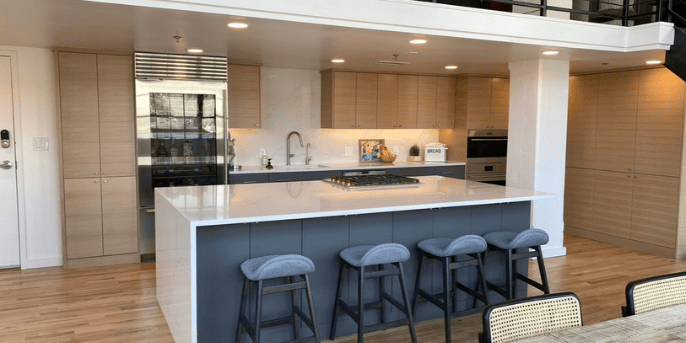For many Utah homeowners, the basement is wasted space — a dark storage zone for holiday boxes, cracked tile, and outdated carpet. It’s where the treadmill goes to die, the Christmas lights get tangled, and the kids’ old toys gather dust. But what if that square footage could start paying you back every single month?
Across Utah, families are realizing that the basement isn’t just extra space — it’s an untapped income stream. With the rise of short-term rentals through platforms like Airbnb and Vrbo, basements have become prime candidates for conversion into fully functional guest suites. Add a private entrance, a kitchen or kitchenette, laundry, and a fresh design — and suddenly that forgotten space transforms into a profitable rental unit.
And the timing couldn’t be better. Demand for unique and affordable short-term stays in Utah is skyrocketing. Park City hosts draw skiers and Sundance visitors. Salt Lake City fills with convention-goers, business travelers, and families visiting the University of Utah. Provo and Orem bring in parents of BYU students, wedding parties, and out-of-town guests. Even quieter towns like Highland or Alpine see strong demand from families seeking suburban comfort with easy freeway access.
Beyond tourists, Utah’s own housing shortage and multi-generational households make basement apartments highly desirable. For homeowners, that means two wins: consistent rental demand and a boost to your property value if you ever sell.
In this guide, we’ll break it all down: the must-have design requirements, Utah’s building codes and rental regulations, realistic cost breakdowns, and exactly how much you could earn by turning your basement into an Airbnb-ready rental unit. Whether you’re in Highland, Draper, Park City, or Salt Lake, this is one of the smartest remodels you can do in 2025.
🎁 LIMITED-TIME OFFER
SCHEDULE YOUR UTAH BASEMENT FINISHING PROJECT WITH US AND RECEIVE A
FREE 65” WALL-MOUNTED TV
SIGN BEFORE CHRISTMAS 2025 TO CLAIM YOURS!
*Offer valid for new basement finishing contracts signed before December 25, 2025. Cannot be combined with other promotions. One TV per household.
Why Utah Basements Make Perfect Airbnb Rentals
Utah homeowners have a unique advantage when it comes to basement conversions. Unlike in other states where basements are rare or purely storage, Utah basements are often large, partially finished, and already have the right bones to become fully livable. With a little remodeling, these spaces can become Airbnb-ready units that bring in steady income year-round. Here’s why:
- Separate Entrances: Many Utah basements were built with walkout designs, side entries, or daylight basements that already provide exterior access. This means guests can come and go without disturbing the main household, which is one of the top features Airbnb travelers look for. Even if your basement doesn’t currently have its own entrance, adding one during a remodel instantly boosts privacy, safety, and guest appeal.
- Tourism Demand: Utah is a magnet for short-term rental demand. Skiers flock to Park City, Snowbird, and Alta in the winter. Summer brings hikers and national park travelers passing through Salt Lake and Utah County. Parents visit students at BYU or the University of Utah. Business travelers fill SLC hotels during the week but increasingly prefer Airbnb stays for comfort. All of this makes a basement rental a year-round income generator.
- Cost Efficiency: Building a backyard ADU or detached guesthouse can easily cost six figures and require complex permitting. By contrast, converting a basement into a legal, livable unit often costs less than half as much — especially since the foundation, exterior walls, and much of the plumbing/electrical framework are already in place. It’s one of the most affordable ways to expand your living space and add rental potential.
- Resale Value: Homes with finished basements — particularly those set up as rental suites — consistently sell faster and at higher prices in Utah’s competitive real estate market. Buyers love the flexibility of having a basement that can serve as a guest apartment, a mother-in-law suite, or an income-generating rental. That means even if you only use your Airbnb for a few years, the investment pays you back again when it’s time to sell.
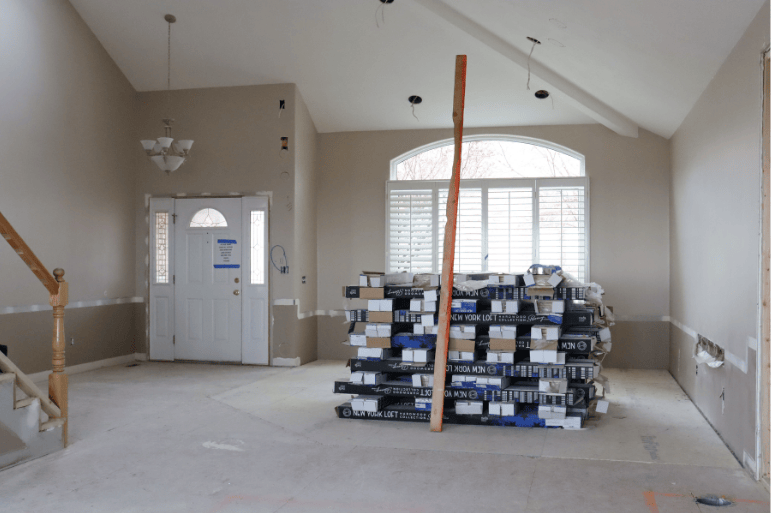
Basement Conversion vs. Other Rental Options in Utah
| Option | Typical Cost Range | Permit Difficulty | Average ROI Timeline | Best For |
|---|---|---|---|---|
| Basement Conversion | $40,000 – $90,000 | Moderate (bedroom egress + rental license) | 3 – 5 years | Homeowners with unfinished or underused basements |
| Backyard ADU (Accessory Dwelling Unit) | $120,000 – $250,000+ | High (zoning + new utilities) | 7 – 10 years | Large lots, families wanting long-term rental units |
| Detached Garage Apartment | $80,000 – $180,000 | High (structural + utility tie-ins) | 5 – 8 years | Properties with existing garages and bigger budgets |
In short, Utah basements aren’t just “bonus space” — they’re one of the most practical and profitable remodel opportunities available. Whether you’re thinking of hosting ski tourists in Park City, visiting families in Provo, or business travelers in Salt Lake, converting your basement into an Airbnb rental is a move that pays off in more ways than one.
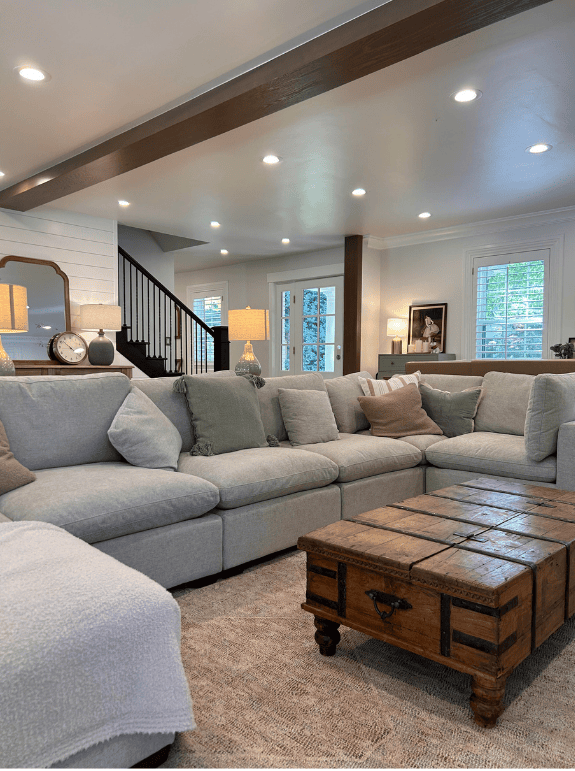
What Every Airbnb-Ready Basement Needs
Turning a Utah basement into an Airbnb rental isn’t as simple as throwing in a bed and calling it good. Guests expect comfort, functionality, and safety — and the city requires that you meet specific codes to make the space legal. Here are the essentials every successful basement rental should have:
- Kitchen or Kitchenette: Most short-term guests want at least basic cooking capabilities. A full kitchen with stove, oven, refrigerator, and dishwasher is ideal for week-long stays, but even a kitchenette with a sink, microwave, fridge, and induction cooktop can make your space stand out. In Utah, once you add a stove or oven, additional electrical and ventilation upgrades are usually required — something to plan for early.
- Laundry Access: Travelers staying more than a couple of nights love having a washer and dryer available. A compact, stackable laundry unit in the basement itself adds tremendous value, while shared laundry with upstairs residents is less attractive. In ski-heavy areas like Park City, laundry access is practically non-negotiable.
- Bedrooms with Egress: Utah building code requires that every legal bedroom has an egress window — a window large enough for a person to escape in an emergency. This means at least 5.7 square feet of clear opening, with the sill no more than 44 inches off the floor. If your current basement bedrooms don’t meet this requirement, installing proper egress windows is a must before you can rent.
- Bathrooms: Airbnb guests expect clean, updated bathrooms. Ideally, plan for one full bath per bedroom, or at least one bathroom for every two guests. Fresh tile, modern fixtures, and good lighting instantly improve reviews — nobody wants a dark, dated bathroom after a long travel day.
- Safety Features: Smoke detectors, carbon monoxide detectors, and fire-rated doors are mandatory. Good lighting, secure locks, and emergency exit signage can also set your basement apart while ensuring peace of mind for guests.
- Private Entrance & Parking: Guest privacy is key to five-star ratings. A walkout basement or side-door entrance is ideal. If you don’t have one, adding a separate entrance during a remodel is one of the best upgrades you can make. Parking also matters — whether that’s a dedicated driveway spot, a gated entry, or clear signage for street parking.
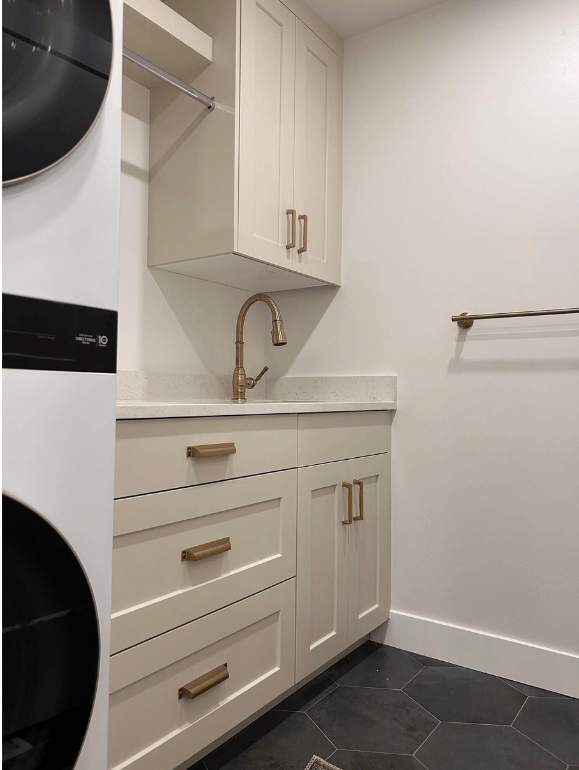
Airbnb Basement Conversion: Must-Haves vs. Nice-to-Haves
| Category | Must-Have Features | Nice-to-Have Upgrades |
|---|---|---|
| Kitchen | Sink, fridge, microwave, counter space | Full range/oven, dishwasher, custom cabinetry |
| Laundry | Stackable washer/dryer or laundry hookups | Separate laundry room, folding counter, utility sink |
| Bedrooms | Egress window, closet, soundproofing | Walk-in closet, ensuite bathroom, built-in shelving |
| Bathrooms | Updated fixtures, proper ventilation, bright lighting | Heated floors, tiled shower, double vanities |
| Safety | Smoke/CO detectors, secure locks, fire-rated doors | Smart locks, video doorbell, motion-sensor lighting |
| Access & Parking | Private entrance, designated parking | Gated driveway, covered entry, mudroom space |
At the end of the day, your basement Airbnb should feel like a self-contained apartment — not a guest room in someone’s house. Meeting the “must-haves” ensures your unit is legal and comfortable, while adding “nice-to-haves” can push your listing into premium territory and justify higher nightly rates.
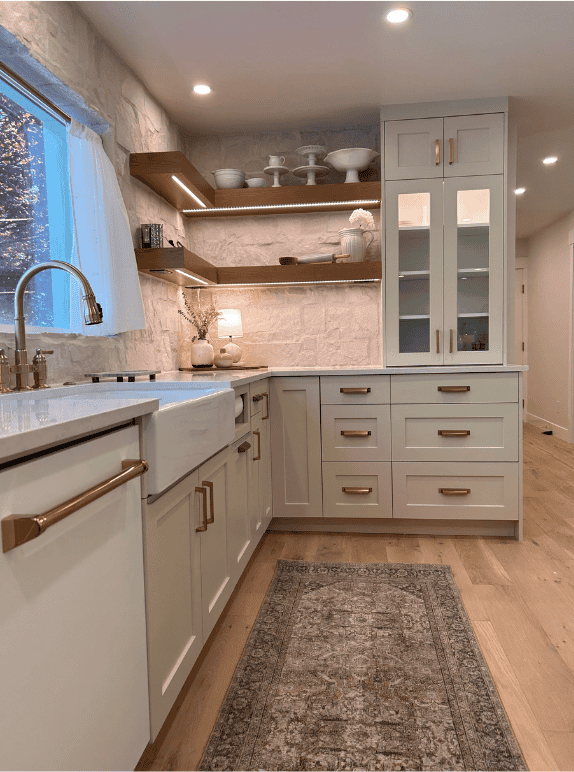
Smart Upgrades Guests Will Notice
Meeting the minimum requirements makes your basement Airbnb legal. But going beyond the basics is what drives higher nightly rates, five-star reviews, and repeat bookings. Guests may not rave about your egress windows, but they will definitely mention the flooring, lighting, or how quiet the space feels. These are the upgrades that turn a basement from “okay” into “outstanding.”
Upgrade #1: Flooring That Feels Fresh
Carpet is a deal-breaker for many Airbnb travelers — it traps odors, looks dated, and is tough to keep clean between guest stays. Replacing old carpet with luxury vinyl planks (LVP) or interlocking floating flooring instantly modernizes the space. These materials are durable, waterproof (perfect for Utah’s snowy winters and muddy springs), and stylish enough to rival upstairs living areas.
Upgrade #2: Soundproofing for Peace of Mind
A common complaint in basement rentals is noise — footsteps from upstairs, voices carrying through vents, or even plumbing sounds. Adding soundproof insulation in ceilings and shared walls makes a huge difference. Not only does it improve guest experience, it also ensures your family upstairs enjoys privacy. This upgrade is particularly valuable in multi-generational homes where the basement is rented year-round.
Upgrade #3: Bright, Inviting Lighting
Basements often feel dark and cave-like, which can turn off Airbnb guests. Upgrading to LED recessed lighting with dimmers, adding wall sconces, or even using smart bulbs can transform the mood. Natural light wells or enlarged egress windows also add brightness and make the space feel more like an above-ground apartment.
Upgrade #4: Fresh Paint & Modern Colors
A new coat of paint is one of the fastest and cheapest ways to boost appeal. Stick to neutral tones like light gray, soft beige, or off-white to keep the space bright and flexible. Accent walls in warm tones can add character without overwhelming guests. In Utah’s market, “light and bright” always wins over “dark and moody” for rental spaces.
Upgrade #5: Bathrooms That Impress
Bathrooms are one of the most-reviewed features on Airbnb. Cracked tile, old vanities, or dim lighting will hurt your ratings. Replacing tile, updating fixtures, and installing glass shower doors instead of curtains all elevate the guest experience. Heated flooring can even be a selling point in Utah’s colder months, making your listing stand out from the competition.
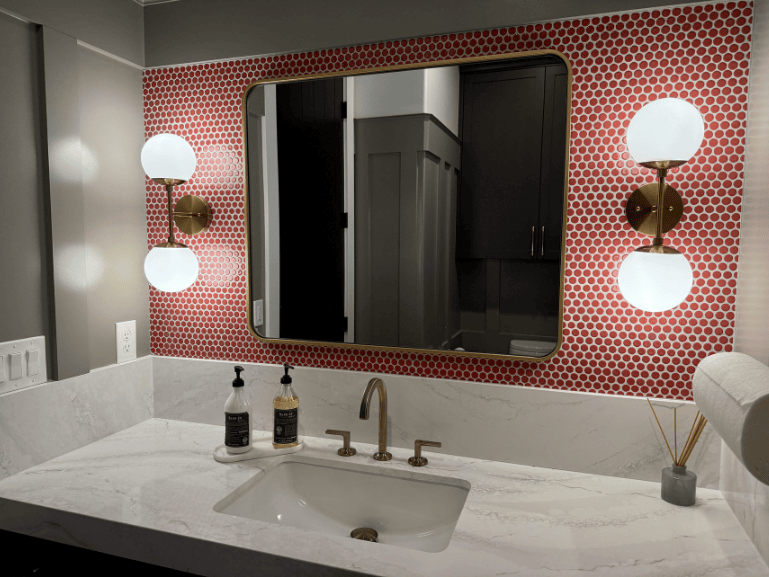
Cost vs. Value: Smart Basement Airbnb Upgrades
| Upgrade | Average Cost Range | Impact on Guest Experience | ROI Potential |
|---|---|---|---|
| Replace Carpet with LVP/Floating Floors | $4 – $8 per sq ft | High (cleaner, modern, easier to maintain) | +10–15% nightly rate |
| Soundproofing Walls/Ceilings | $2,500 – $6,000 | High (better reviews, fewer complaints) | Improves occupancy consistency |
| Lighting Upgrades (LEDs, Dimmers) | $1,500 – $4,500 | Medium-High (better ambiance) | +5–10% nightly rate |
| Fresh Paint (Neutral Colors) | $3 – $6 per sq ft | Medium (clean, modern look) | Quick cosmetic ROI |
| Bathroom Remodel/Upgrades | $8,000 – $20,000 | High (direct impact on reviews) | +15–20% nightly rate |
Each of these upgrades improves the guest experience, but combined, they can transform your basement into one of the most desirable Airbnb options in your area. In competitive Utah markets like Salt Lake, Provo, or Park City, these details often justify higher nightly rates and keep your listing fully booked.
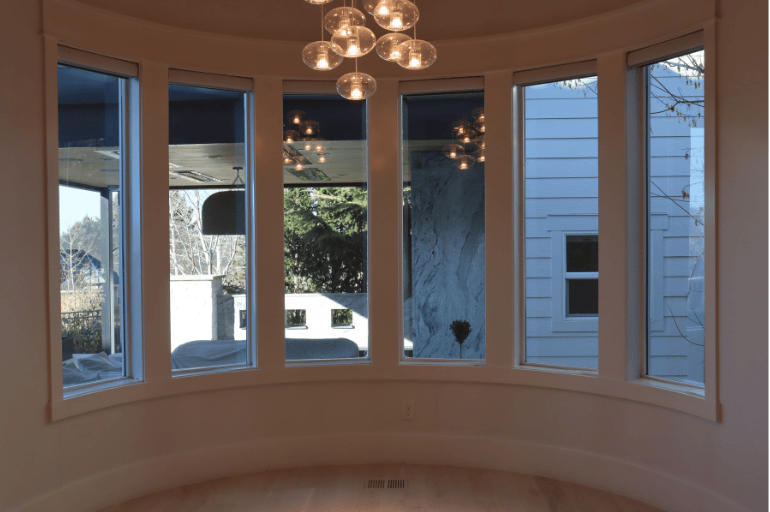
Utah Codes, Permits & Zoning Rules
Converting a basement into an Airbnb isn’t just about design — it’s also about making sure your unit is safe, legal, and fully compliant with Utah regulations. Requirements vary depending on the city, but there are a few universal codes and zoning rules you’ll need to be aware of before hosting your first guest.
Bedroom & Egress Requirements
- Every legal bedroom in Utah must have an egress window with a clear opening of at least 5.7 square feet.
- The window sill can’t be more than 44 inches off the floor.
- If the window opens into a window well, that well must be at least 36 inches deep with a permanent ladder or steps if it’s deeper than 44 inches.
This is one of the most common issues Utah homeowners run into when finishing a basement. Without egress windows, your bedrooms won’t pass inspection — and you can’t legally advertise them as bedrooms on Airbnb.
Kitchen & Laundry Codes
- Adding a stove or oven typically reclassifies the space as a secondary dwelling unit (ADU) and triggers stricter electrical and ventilation requirements.
- Laundry hookups must be properly vented and connected to existing plumbing. Improperly vented dryers are a major fire hazard and will fail inspection.
Safety Requirements
- Basement rentals must have smoke detectors and CO2 detectors outside every sleeping area and on every level.
- Fire-rated doors (20-minute minimum) are required if the basement connects directly to the upstairs living space.
- Emergency lighting or clearly visible exit routes may be required, depending on the city.
Zoning & Licensing by Utah City
- Highland: Requires a business license for short-term rentals. Parking requirements must be met (usually 1 off-street space per rental unit).
- Provo: Provo has strict rules limiting short-term rentals to specific zones. If you’re near BYU, you may face restrictions. Always confirm zoning before starting a remodel.
- Park City: Known for tight regulations due to tourism. Short-term rentals are generally allowed only in certain resort zones. Outside of those areas, you may only be able to rent long-term.
- Salt Lake City: Allows ADUs and basement rentals but requires a building permit and inspection. Off-street parking is strongly preferred, and separate entrances are recommended.
Insurance Considerations
Standard homeowner’s insurance does not cover damages from short-term rental activity. You’ll need to add a landlord rider or purchase Airbnb’s Host Protection insurance. Without proper coverage, you could be on the hook for guest damages or liability claims.
Bottom line: before investing in upgrades, make sure your basement qualifies for rental use in your city. Pro-Worx helps homeowners navigate permits, code compliance, and inspections so your Airbnb unit is fully legal and future-proof.
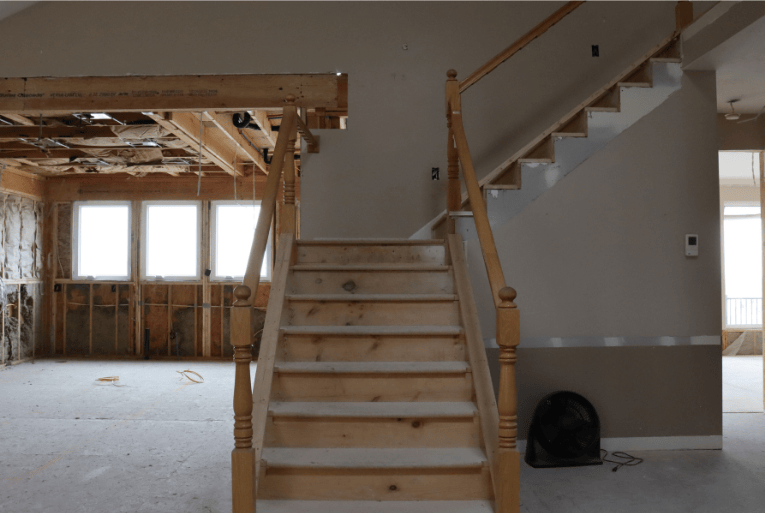
Basement Conversion Cost Breakdown in Utah
Here’s a realistic cost range for converting a basement into an Airbnb-ready unit. Prices vary depending on square footage, finishes, and location (Salt Lake, Utah County, or Summit County tend to run higher).
| Upgrade | Typical Cost Range | Notes |
|---|---|---|
| Kitchenette Installation | $10,000 – $25,000 | Cabinets, sink, appliances, plumbing, ventilation |
| Laundry Room Addition | $2,500 – $6,000 | Stackable units, hookups, venting, plumbing |
| New Bedroom Addition | $8,000 – $20,000 | Includes framing, drywall, electrical, egress window |
| Flooring Replacement | $4 – $8 per sq ft | LVP or floating floors; waterproof options recommended |
| Interior Painting | $3 – $6 per sq ft | Walls & ceilings; neutral tones preferred for rentals |
| Driveway Gate | $2,000 – $7,500 | Wood, metal, or motorized entry systems |
| Bathroom Remodel (per bathroom) | $8,000 – $20,000 | Tile, vanity, fixtures, lighting upgrades |
| Soundproofing | $2,500 – $6,000 | Acoustic insulation in ceilings & shared walls |
| Lighting Upgrades | $1,500 – $4,500 | Recessed LEDs, dimmers, additional windows/wells |
How Much Could You Earn From an Airbnb Basement in Utah?
Short-term rental income varies by location, season, and level of finish. Here’s a projection based on 70% occupancy — typical for active Airbnb hosts in Utah.
| Location | Average Nightly Rate | Monthly Income (70% occupancy) | Estimated Break-Even |
|---|---|---|---|
| Salt Lake City | $150 – $200 | $3,100 – $4,200 | 3 – 5 years (mid-range remodel) |
| Highland / Utah County | $120 – $160 | $2,500 – $3,400 | 4 – 6 years (budget remodel) |
| Park City (Ski Season) | $250 – $400 | $5,300 – $8,400 | 2 – 4 years (luxury remodel) |
These numbers assume 70% occupancy. During peak ski season in Park City, many units hit 90–100% occupancy at premium rates. On the flip side, budget remodels in Utah County may take longer to recoup costs but still offer consistent demand from families and university visitors.
Case Study: Highland, UT Basement Conversion
A recent Pro-Worx client in Highland had a basement with one bedroom and two baths. They wanted to transform it into a rental-ready Airbnb with more functionality. Here’s what we did:
- Added a kitchen and laundry room for full guest independence.
- Built out an additional bedroom for more rental capacity.
- Replaced cracked tile and swapped carpet for floating flooring.
- Repainted walls for a modern look.
- Installed a driveway gate for guest parking privacy.
The result: a basement that rents for $150+ per night, generating $3,000+ monthly income while boosting overall property value.
The Pro-Worx Process
Turning your basement into an Airbnb-ready rental may sound overwhelming — but with Pro-Worx Construction, the process is straightforward, organized, and stress-free. We’ve refined our approach to make sure every project moves smoothly from idea to income. Here’s how we do it:
1. Consultation
It all starts with a walk-through. Our team visits your property, evaluates the current condition of your basement, and listens to your goals. Whether you want a cozy guest suite, a full Airbnb apartment, or a long-term rental unit, we’ll review your space, discuss your budget, and outline your options. This step ensures we understand your vision and can give you a realistic scope of work.
2. Design & Planning
Once we know your goals, our designers map out the layout. This includes positioning new bedrooms, planning kitchens or kitchenettes, adding laundry areas, and designing safe, private entrances. We also plan for natural light, soundproofing, and efficient use of space. Our team uses modern design tools so you can see how your basement will transform before construction begins.
3. Permitting & Code Compliance
Utah cities like Highland, Provo, and Park City all have different zoning laws and building requirements. That’s where we come in. Pro-Worx handles the permitting process, submits plans to the city, and ensures your project meets all building codes — from egress window requirements to fire safety. This saves you the headache of navigating city paperwork and inspections.
4. Construction
With plans and permits in place, our licensed crews get to work. We handle everything: framing, electrical, plumbing, drywall, flooring, and finishes. Because Airbnb rentals require extra attention to detail, we prioritize quality and durability — making sure your space can handle frequent guest turnover without constant maintenance headaches.
5. Finishing Touches
Once the heavy work is done, we focus on the details that make your Airbnb stand out. This includes fresh paint, modern fixtures, recessed lighting, floating flooring, and bathroom upgrades. If needed, we can also coordinate staging to help your listing photos shine — because the way your rental looks online directly affects how often it books.
From the first consultation to the last coat of paint, our process is designed to keep you informed, reduce stress, and deliver a finished basement that’s not only code-compliant, but also guest-ready and income-generating from day one.
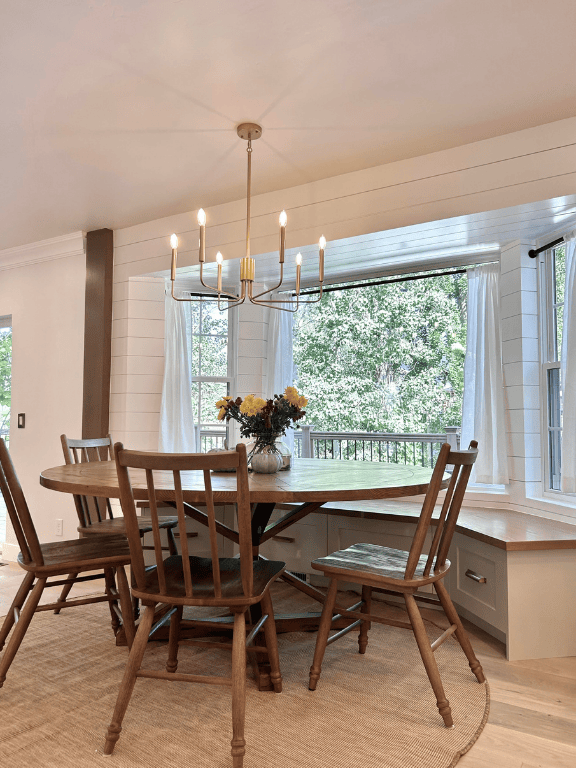
FAQs
Do I need a permit to turn my basement into an Airbnb?
Yes. Utah cities require permits for adding kitchens, bedrooms, and rental units. Rules vary by city.
How long does a conversion take?
Most projects take 8–16 weeks depending on scope and permitting.
What flooring works best in Airbnb basements?
Luxury vinyl planks or interlocking floating floors. They’re durable, waterproof, and easy to clean.
Can I rent out my basement without a separate entrance?
Technically yes, but guest reviews (and privacy) will suffer. We strongly recommend adding one.
What’s the ROI on a basement conversion?
Many Utah homeowners see payback in 3–5 years, faster in ski or university markets.
Ready to Turn Your Basement Into an Income Stream?
At Pro-Worx Construction, we specialize in Utah basement finishing and remodel projects and guest suites that add real value. Whether you want a guest suite, rental apartment, or full Airbnb unit, our team handles design, permits, and construction — so you can focus on earning.
🎁 LIMITED-TIME OFFER
SCHEDULE YOUR UTAH BASEMENT FINISHING PROJECT WITH US AND RECEIVE A
FREE 65” WALL-MOUNTED TV
SIGN BEFORE CHRISTMAS 2025 TO CLAIM YOURS!
*Offer valid for new basement finishing contracts signed before December 25, 2025. Cannot be combined with other promotions. One TV per household.


